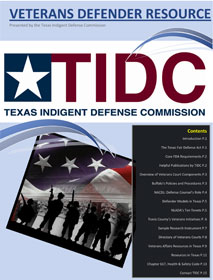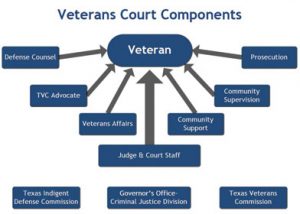The 81st Texas Legislature authorized counties to establish a Veterans Court, and those interested in creating such a court now have a thorough resource guide.
 The Texas Indigent Defense Commission (the Commission) has published the Veterans Defender Resource for county and court officials who are interested in the establishment of a new Veterans Court or enhancing their existing problem-solving courts with the addition of a defender component.
The Texas Indigent Defense Commission (the Commission) has published the Veterans Defender Resource for county and court officials who are interested in the establishment of a new Veterans Court or enhancing their existing problem-solving courts with the addition of a defender component.
“Sen. Rodney Ellis and I authored legislation to create Veterans Courts in Texas counties because we saw the need to recognize the unique challenges faced by service members who have endured the stresses of combat,” said Sen. Leticia Van de Putte. “Our war fighters have sacrificed so much for us; they deserve special consideration in helping deal with the complexities within the criminal justice and legal system.”
Defendants are eligible to participate in a veterans court program only if the attorney representing the state consents to the defendant’s participation in the program and if the court in which the criminal case is pending finds that the defendant is:
- a veteran or current member of the United States armed forces, including a member of the reserves, national guard, or state guard; and
- suffers from a brain injury, mental illness, or mental disorder, including post-traumatic stress disorder that resulted from the defendant’s military service in a combat zone or other similar hazardous duty area, and materially affected the defendant’s criminal conduct at issue in the case.
The Commission provides an array of support to counties that wish to implement initiatives that will improve access to the right to counsel, such as Veterans Courts. The Veterans Defender Resource provides information about how counties can access this support through the Commission’s discretionary grant programs. Additionally, the Resource includes a directory of the currently operating Veterans Courts programs throughout the state. Many of the judges who have chosen to run Veterans Courts may be valuable sources of wisdom and advice as a new court is formed.
“The veteran’s court has been an incredible experience. This program is not a gift to a veteran, it is an opportunity,” said Judge Brent Carr of Tarrant County. “By completing a professionally designed course of therapy and treatment, the veteran has the opportunity to correct destructive behavior and have his or her good name restored. This is good for the veteran, the veteran’s family, and the community. It’s the least we can do.”
Below is an excerpt from The Veterans Defender Resource, which is available in full on the Commission website:
http://www.courts.state.tx.us/tidc/pdf/VetDefenderMarch28Publication(Final).pdf
The Veterans Defender Resource
This publication provides county and court officials with resources that may be helpful as they consider the design and implementation of a Veterans Court in their own communities. During the 81st Texas State Legislative Session, Sen. Rodney Ellis, D-Houston, and Rep. Allen Vaught, D-Dallas, authored Senate Bill 112, which passed as part of Senate Bill 1940, authored by Sen. Leticia Van de Putte, D-San Antonio. Taking effect on Sept. 1, 2009, as Chapter 617 of the Health and Safety Code, local officials in Texas were given the authority to establish Veterans Courts. Harris County was the first to implement a specialty court for veterans. Funded in part by the Criminal Justice Division of the Governor’s Office, the Harris County program also received support from the Texas Indigent Defense Commission (formerly the Task Force on Indigent Defense) to support the defense component of its program.
The Texas Indigent Defense Commission provides financial and technical support to counties to develop and maintain quality, cost-effective indigent defense systems that meet the needs of local communities and the requirements of the Constitution and state law. In addition to providing state funding to counties for the provision of indigent defense services, the Commission provides information, technical assistance and an array of additional resources for counties to improve their systems. Since 2003, the Commission has awarded funding to seven counties to support their efforts to provide specialized defender programs that represent defendants with mental health issues, including the first stand-alone mental health public defender in the nation.
As more counties explore the possibility of creating their own programs to meet the needs of veterans, the Commission can provide resources and assistance to help ensure that a participant’s right to defense counsel is adequately protected, a particularly important consideration for defendants with mental health issues. The Commission’s research has demonstrated that defense attorneys with special mental health training can provide better representation to their clients. In fact, one of the key findings in the Commission’s 2010 report, Representing the Mentally Ill Offender, showed statistically significant reductions in recidivism up to 18 months after case disposition.
While the Commission’s primary objective for compiling this information is focused on the role of defense counsel in representing veterans, some of the material provides insight into the creation and operation of a Veterans Court, including links to a recently published Policy and Procedure Manual for the Buffalo Veterans Treatment Court in Buffalo, New York.
Judicial Role
While only the commissioners court of a county may authorize the creation of a veterans court program, the judge presiding over the court tends to serve the most central role in the administration of problem-solving dockets. The judge can impose sanctions, terminate a participant from the program, or order the participant to enter a variety of detoxification or treatment programs. The judge often uses public praise to recognize veterans for meeting their goals. In fact, the transitions between each phase of the program are often conducted like graduations, with certificates and other forms of recognition. The judges who choose to dedicate the extra effort and energy toward leading this sort of program are usually very familiar with the issues that participants bring to the table and often have similar experience operating other specialty court programs. Veterans Courts are not necessarily one-chance programs, and the judges often attempt to ensure that participants are given room to succeed.
Defense Counsel
The defense counsel’s role in a Veterans Court is to provide zealous advocacy. In addition to presenting and explaining options to the client, counsel must offer the client the best possible advice based on the lawyer’s experience and thorough investigation of the case. While some of the cases may present complex legal challenges that require research and legal expertise, many will require a different skill-set that may seem more akin to the activities of a mentor or coach. Still, the role of an experienced criminal defense lawyer is critical to the success of the program.
Prosecution
Chapter 617 of the Health and Safety Code describes Veterans Courts as programs that make use of a non-adversarial approach involving prosecutors and defense attorneys to promote public safety and to protect the due process rights of program participants. Eligibility for participation is granted only if the attorney representing the state consents to the defendant’s participation in the program and if the court finds that the defendant is a veteran or current member of the United States Armed Forces and suffers from a brain injury, mental illness, or mental disorder, including post-traumatic stress disorder that resulted from the defendant’s military service in a combat zone and materially affected the defendant’s conduct at issue in the case.
Veterans Affairs (VA)
As the number of Veterans Courts increased across the country, the VA responded with the creation of the Veterans Justice Outreach Initiative to educate the courts, law enforcement, and jails on the issues facing veterans. Veterans Outreach Specialists help veterans avoid unnecessary incarceration through integration into VA substance and mental health treatment programs. To be eligible for treatment services from the VA, veterans need an honorable discharge and two or more years of active duty service.
The success of Veterans Courts can be easily attributed to connecting with VA services as early as possible for each eligible case, but many courts need to be educated about the VA services that are available and how the VA can be utilized to assist a troubled veteran. Of course, the judge over the case makes the final decision whether the programs offered by the VA are suitable for the participant.
Community Supervision
Community supervision and corrections departments can be involved in post- and pre-plea programs for veterans. Community supervision officers assess each participant’s level of risk and need using appropriate assessment tools and then help to design an appropriate supervision plan. The plan includes the conditions stipulated by the courts for completion of the program.
The programs, services and tools community supervision departments use in programs for veterans may be similar to the tools that are used for other defendants, including: urinalysis testing, community service restitution, domestic violence programs, education programs, electronic monitoring, employment programs, substance abuse treatment, victim’s services, and substance abuse treatment facilities.
Governor’s Office-Criminal Justice Division (CJD)
CJD’s mission is to create and support programs that protect people from crime, reduce the number of crimes committed, and to promote accountability, efficiency, and effectiveness within the criminal justice system. CJD focuses on the enhancement of Texas’ capacity to prevent crime, provide service and treatment options, enforce laws, train staff and volunteers, and the restoration of crime victims to full physical, emotional and mental health.
Texas Indigent Defense Commission
The latest Strategic Plan published by the Commission in late 2010 covers the broader goals and priorities that guide the Commission and its staff. Three of the central themes that run through the Commission’s strategic plan and other publications are 1) respect for local control, 2) the promotion of evidence based practices, and 3) the pursuit of effective funding strategies.
Indigent defense services in Texas are largely paid for and provided by county governments. With this in mind, the Commission is mindful of the potential costs associated with implementing additional requirements. Because they are in a better position to understand what will be most effective in their own counties, local officials choose how they will implement systems that adhere to state and constitutional requirements. The same would apply to a county interested in implementing a new specialty defender.
Texas Veterans Commission (TVC)
TVC plays a role in coordinating efforts of service providers, sharing resources, providing training, and developing a partnership with other levels of government to assist veterans.
Defender Models in Texas
Texas counties that are considering the creation of a Veterans Defender Program may choose from several options that can best fit the needs of the county while maintaining fidelity to the Fair Defense Act. The following chart provides a very brief overview of the models that are most prevalent.
















